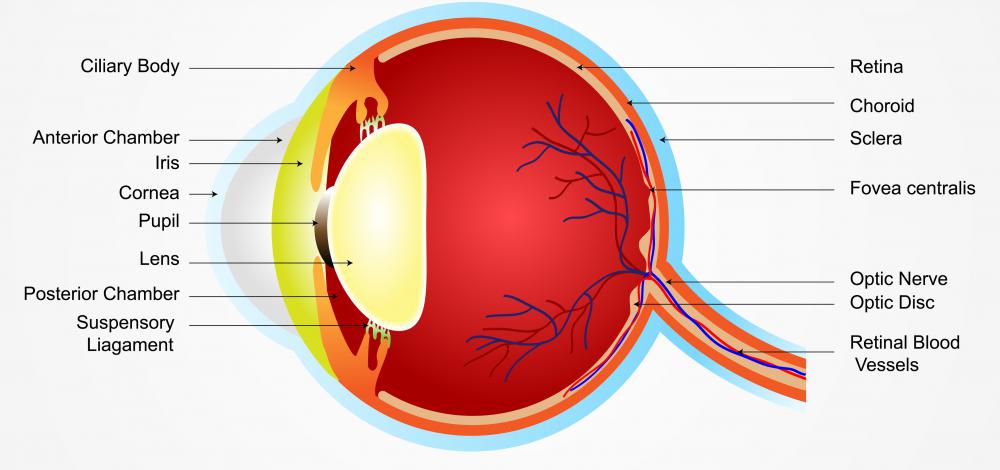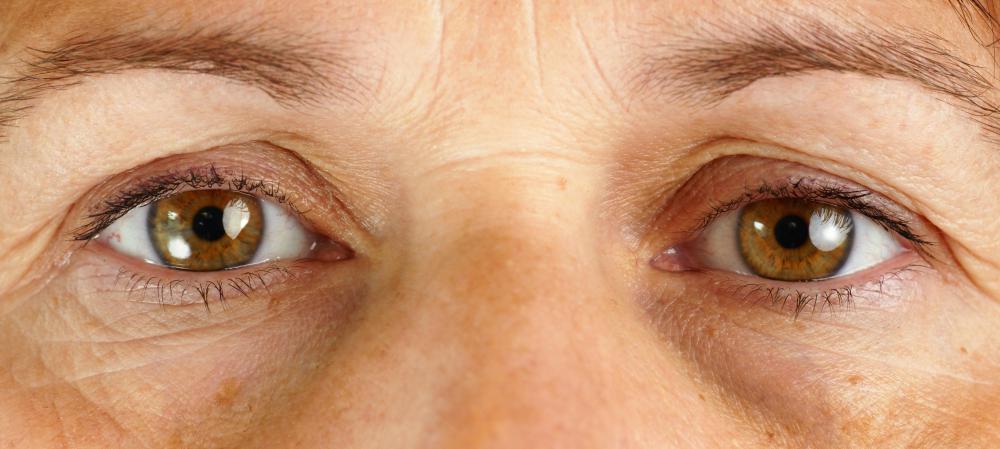At WiseGEEK, we're committed to delivering accurate, trustworthy information. Our expert-authored content is rigorously fact-checked and sourced from credible authorities. Discover how we uphold the highest standards in providing you with reliable knowledge.
What is an Artificial Eye?
An artificial eye is a prosthesis which is used to replace a missing or damaged eye. There are two types of artificial eyes: ocular and visual prostheses. An ocular prosthesis replicates the missing eye for aesthetic reasons, serving no medical function beyond supporting the eye socket. A visual prosthesis actually provides visual input to the wearer by stimulating the optic nerve, allowing him or her to experience some sight.
Humans have been making ocular prostheses for hundreds of years. The loss of an eye is not terribly uncommon, but it can create an appearance which may be disturbing or frightening to some people. Wearing an ocular prostheses can given someone a normalized appearance, attracting less attention. Inserting a prosthesis into the eye socket will also provide support, reducing the risk of collapse. The loss of one eye will have a profound impact on depth perception, but many people learn to function very effectively with a single eye.

In the mid-20th century, researchers began to explore the idea of creating an artificial eye which could actually see. In order to accomplish the goal of creating a visual prosthesis, scientists had to develop a camera which could interact with the brain by stimulating the optic nerve. This is accomplished by sending electrical signals similar to those which would be sent by a real eye. The brain interprets those signals just like it would if a biological eye was in place.

The science behind the artificial eye is constantly being refined as researchers explore better camera designs and perfect the communication system between the camera and the brain. In the early 21st century, a number of high-functioning artificial eyes had been demonstrated in experimental programs. The development of reliable visual prostheses can make a huge difference to people with severe vision damage or blindness in one or both eyes.

Whether an artificial eye is a visual or ocular prosthesis, it needs to be carefully fitted to the wearer. Everyone's eye sockets are slightly different, and the prosthesis must fit smoothly and comfortably, or it will cause pain, and it could potentially injure the nerves or damage the eye socket. Fitting the prosthesis usually involves multiple sittings of molding and measuring to get as much data as possible about the structure of the eye socket. Once the prosthesis has been created, the patient attends a fitting session and learns how to care for the artificial eye and the eye socket.
AS FEATURED ON:
AS FEATURED ON:













Discussion Comments
There was a math teacher at my high school that had a glass eye. The reason I knew he had a glass eye is because everyone else told me about it, and of course, I had to check it out for myself.
He indeed did have a glass eye, as it did not move. He would openly talk about too, so that was a major tip-off. I don't think people would have noticed as much if he taught at a college rather than a high school. In high school it seems like everyone tells anyone everything they have heard, and a lot of kids are obsessed with appearances.
I wonder how this math teacher, and others, lost his/their eye. I would not ever ask someone this, but it does make me wonder. It seems pretty traumatic to lose an eye, but I am sure someone would rather lose one eye than both eyes.
I don't know whether this teacher had an ocular prosthesis or a visual prosthesis, as I did not even know they have visual prosthesis' that people can actually see out of. That is pretty incredible that science has come so far that they figured out a way to make a fake eye that can help people see!
My niece has had eye problems for most of her life. She was not born blind, but has always had decreased vision. She is now a young adult and is considered legally blind.
There have been so many exciting advances in this field. She has gone through some testing and looks to be a good candidate for a possible artificial eye that can see.
She doesn't want to get her hopes up too high, but something like this would be life changing for her. We are all hoping the technology will be available for her in a few years to try something like this.
Even if she only had one eye that could see, it would make all the difference in the world for her.
I have personally known two people who have an artificial eye implant. Both of them have had these for a long time, and they aren't that noticeable behind their glasses.
When you are talking to them, and looking in their eyes, the artificial eye just doesn't move like the other eye does.
I think it would take some time to get used to seeing out of just one eye. I wear contacts, and use one contact for reading, and one for distance.
Until I got used to this, I had horrible headaches. It took a few weeks for my eyes to adjust, but now I don't even think about it.
Since this is all they have known for so long, they probably don't think about it either. As far as I know, neither one of them have any kind of restrictions when it comes to driving or anything either.
@jmc88 - Yes you do have to thoroughly clean glass eyes and you must do so using a sort of saline solution. Some people use very very clean water in order to clean their glass eyes and when you put the eye in there is a special type of lubricant that can be used.
A glass eye is all about comfort and if something does not feel right it can be a disaster. A glass eye is something you really need to have in, as opposed to contacts which if your eyes hurt you can just wear glasses for the day. That is why it is essential to take great care in maintaining one's glass eye and make sure that it is clean enough to put into the eye socket.
The worst thing that can be done to a glass eye is to drop it. Any slight abrasion can cause the eye to become worthless. A glass eye must be perfectly smooth and once it touches something hard or or rough it can ruin the eye and make it a hazard to put in the eye socket.
@titans62 - One thing I have always wondered about artificial eyes is whether you have to use any type of artificial eye lubricant in order to make sure that the eye socket does not hurt.
I have seen Pirates of the Caribbean and seen that one of the characters has a glass eye that keeps falling out. His eye is made of wood and looks supremely uncomfortable, but did make me think about how uncomfortable and artificial eye could be, if it is dry or falls out.
I wear contacts and my eyes hurt if they are dry and I cannot imagine putting an entire fake eye into my socket if it is dry or not entirely clean. This makes me wonder if there are things out there to clean glass eyes and how often they need to be cleaned.
I have not seen people with the essentially bionic eye, but I have seen and know people with a glass eye and feel like it is hardly noticeable at all, as long as it is a good one.
My uncle lost his eye as a kid, due to a fireworks accident and has had an artificial glass eye since he was around ten. Over the years as he has gotten older he has been fitted for a new glass eye, not necessarily for size, but rather just to change out eyes and get a new one after years of wear.
One thing he has told me is that weight is a major deal with glass eyes and that it is important to get a glass eye that has perfect weight. If it is too heavy it can wear on the eye lid and make the eyes appear off balance and if it is too light weight it can have the opposite effect.
Wow I find this quite amazing that they can actually make an artificial eye that can see. I would have never thought that this was possible and it definitely shows how far technology and science have gone and the discoveries that have been made.
The eye is something that seems to be irreplaceable if it is damaged to the point that it is useless and is something that is a wonder in human physiology that cannot be replicated by science other than for aesthetic reasons. However, it seems like science has come a long way and I have to now wonder how much one of these artificial, essentially bionic eyes would cost.
Post your comments